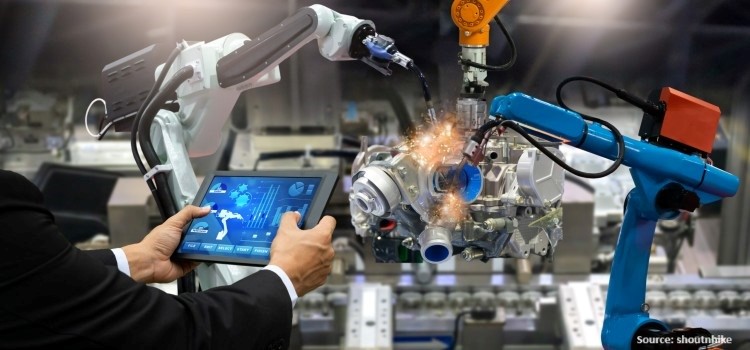
Distributed Control System (DCS) Market by Component (Hardware, Software, and Services) by Application (Batch and Continuous Process), by Project Type, (New Construction, Replacement, and Upgrade/Expansion), by End User (Oil & Gas, Chemicals & Refining, Energy & Power, Pulp & Paper, Metals & Mining, Pharmaceutical & Biotech, Food & Beverages, Cement & Glass, Water & Wastewater, and Others) Global Opportunity Analysis and Industry Forecast 2024–2030
Industry: Semiconductor & Electronics | Publish Date: 25-Jan-2024 | No of Pages: 395 | No. of Tables: 311 | No. of Figures: 258 | Format: PDF | Report Code : N/A
Market Overview
The global Distributed Control System (DCS) Market size was valued at USD 29.01 billion in 2023, and is predicted to reach USD 44.05 billion by 2030, with a CAGR of 6.1% from 2024 to 2030. Distributed control system (DCS) is a type of computer-based control system used to control and monitor automation in industrial processes. It consists of a network of controllers distributed throughout an industrial facility. These controllers communicate with each other to coordinate and automate the industrial process.
DCSs are used in a wide range of industries, including chemical & petrochemical, pharmaceuticals, foods & beverages, and power generation. They are particularly useful in large-scale industrial processes that require a high degree of automation and control, such as oil refineries, chemical plants, and power stations. DCS controls and monitors various processes such as drilling, refining, blending, manufacturing, filtration, and disinfection to ensure high quality, efficiency, and safety.
Growing Consumer Demand for Clean and Renewable Energy Drives the Industry Expansion
In the renewable energy sector, DCS plays a critical role in managing the generation, storage, and distribution of electricity from renewable sources such as wind, solar, and hydropower. As the adoption of renewable energy sources continues to grow, the power grid becomes more distributed and complex, which highlights the need for DCS to integrate and manage these diverse energy sources effectively.
DCS plays an essential role in monitoring and controlling the flow of electricity from different sources, ensuring that energy storage systems are used optimally. Thus, the rise in demand for renewable energy is a significant driver for the growth of distributed control systems in the energy sector. For instance, in February 2023, ABB launched Ability Symphony Plus Distributed Control System that delivers seamless and secure access to an extended digital ecosystem for power generation and water industries.
The Surge in Investments in the Manufacturing and Processing industry
The increase in investments in the manufacturing and processing industry propels the growth of the distributed control system (DCS) market. As the manufacturing and processing industry expands, there is a growth in the demand for advanced control systems that can help optimize production processes and increase efficiency. In addition, advancements in technology, such as the Internet of Things (IoT) and artificial intelligence (AI), are making DCS systems more powerful and capable than ever before, which further drives demand for these systems.
These factors enforce companies to improve operations and remain competitive in the global marketplace. For instance, in November 2020, Mitsubishi Electric India launched the GOC43, an indigenous human-machine interface (HMI) controller. It was designed and developed by the Factory Automation & Industrial Division at its R&D center in India. The device is compatible with the most of the automation systems, including DCS. It is designed to withstand harsh industrial environments, making it ideal for use in various industries, including manufacturing, pharmaceuticals, HVAC, and automotive.
The Threat of Cybercrime Hinders the Expansion of the Market
DCS systems are inclined to cyberattacks as they are networked and computerized. Cybercriminals can gain unauthorized access to DCS systems, compromise sensitive data, and disrupt critical infrastructure, causing significant financial losses and reputational damage. The consequences of a successful cyber-attack on a DCS system can be severe, especially in industries such as power generation, oil & gas, and chemical processing, where disruptions can have significant environmental and public safety implications.
The Introduction of Modular and Flexible DCS Systems Creates Ample Growth Opportunities
The introduction of modular and flexible DCS systems can create ample growth opportunities for the DCS market. Traditionally, DCS systems have been highly centralized and monolithic, with large-scale installations that are expensive and complex to install and maintain. However, the introduction of modular and flexible DCS systems is changing this paradigm.
Modular systems are designed to be more flexible and scalable, with a modular architecture that allows easy integration with other systems and components. This makes it easier to customize DCS systems to meet the specific needs of individual organizations without the need for costly and time-consuming customization.
ABB’s modular-enabled process automation solution that combines an orchestration layer is one of the major examples of a modular and flexible DCS system. It also comprises a module layer integrated with module type packages (MTPs) technology for cost-effective modularization. This solution is designed to provide end-users such as mining, pharmaceuticals, and biotech with an automation solution that can fit their applications better than programmable logic controllers (PLCs) and costs less than a traditional DCS.
North America Holds a Major Share of the Global Distributed Control System Market
The region has a well-developed pharmaceutical industry that produces a wide range of drugs and medical products. Some of the world's largest pharmaceutical companies, such as Pfizer, Merck, and Johnson & Johnson, are headquartered in the U.S. DCS is used in pharmaceutical manufacturing facilities to monitor and control various processes, such as chemical reactions, mixing, filtration, and purification. DCS systems can be used to automate and optimize these processes to improve efficiency, quality, and safety.
Moreover, the International Trade Administration stated that Mexico was the fourth-largest oil producer in the Americas after the U.S., Canada, and Brazil in 2021, producing 1.9 million barrels per day. The oil & gas industry is one of the major users and contributors of DCS technology, which further contributes to the expansion of the market.
Moreover, the presence of major market players such as ABB, Honeywell International, Inc., Rockwell Automation, Inc., and Emerson Electric Co., which are implementing market strategies to maintain their dominance globally, also contribute toward the market expansion.
For instance, in December 2022, Emerson expanded its partnership with ZEDEDA. This company offers an edge computing platform for the deployment, management, and security of applications and services on distributed edge devices to modernize the industrial edge. As a part of the collaboration, ZEDEDA's edge management and orchestration solution will be integrated into Emerson's DeltaV automation system, enabling Emerson’s customers to extend DeltaV to the distributed edge.
Europe Witnessed a Substantial Growth in the Distributed Control System Market
Europe is extensively focused on Industry 4.0, with countries such as Germany, France, and Sweden contributing toward high demand for DCS solutions across the region. The European Union (EU) has also launched a "Factory of the Future" program, which focuses on developing smart factories that use automation and data analytics such as supervisory control and data acquisition (SCADA) and DCS to optimize production processes and improve product quality. The DCS market is supported by substantial contributions of European countries in renewable energy, such as wind & hydropower plants.
In addition, the use of DCS in the energy and power industry to track and manage various power generation, transmission, and distribution activities drives the growth of the market. DCS offers real-time monitoring to maintain the safe and effective functioning of key equipment, including turbines, generators, boilers, and transmission lines. DCS technology has become an essential tool for managing and monitoring the operations of nuclear power plants.
According to the International Energy Statistics, in 2021, nuclear power plants in France produced 361 billion kilowatt-hours of electricity, representing 68% of the country's total annual electricity production. This percentage is the highest in the world regarding nuclear power generation. Therefore, there is a huge demand for DCS in the region.
Competitive Landscape
The distributed control system industry includes various market players such as Rockwell Automation, Inc., ABB Ltd., Honeywell International, Inc., Siemens AG, Emerson Electric Co., Yokogawa Electric Corporation, Schneider Electric, Toshiba Corporation, Mitsubishi Electric Corporation, Hitachi Ltd., Valmet Oyj, Ingeteam Corporacion S.A, General Electric Co., Omron Corporation, and Azbil Corporation.
These market players are adopting various strategies, including product launches and collaboration, to increase their market presence. For instance, in February 2023, ABB launched a new DCS, ABB Ability Symphony Plus. This includes the latest features and functionalities, such as enhanced integration with ABB's digital solutions, expanded connectivity options, improved alarm management, and advanced analytics capabilities.
Also, in December 2022, Rockwell Automation announced the latest update to FactoryTalk Logix Echo emulation software, which allows users to simulate and optimize their control systems in a virtual environment. The new version of the software includes enhanced simulation tools, improved connectivity, and increased support for the latest control system technologies.
In addition, in November 2022, Yokogawa Electric Corporation subsidiary Yokogawa Australia collaborated with the YURI Operations Pty Ltd for the YURI green hydrogen project. They aim to provide the integrated control system for the initial phase of the YURI Green Hydrogen Project, which will construct the largest industrial-scale renewable hydrogen production facilities in Australia.
Distributed Control System Market Key Segments
By Component
-
Hardware
-
Controller
-
I/O
-
Workstation
-
Networking Hardware
-
-
Software
-
Service
-
Integration and Implementation
-
Managed Services
-
Support and Consultation
-
By Application
-
Batch
-
Continuous Process
By Project Type
-
New Construction
-
Replacement
-
Upgrade/Expansion
By End User
-
Oil & Gas
-
Chemicals & Refining
-
Energy & Power
-
Pulp & Paper
-
Metals & Mining
-
Pharmaceutical & Biotech
-
Food & Beverages
-
Cement & Glass
-
Water & Wastewater
-
Others
By Geography
-
North America
-
The U.S.
-
Canada
-
Mexico
-
-
Europe
-
The U.K.
-
Germany
-
France
-
Italy
-
Spain
-
Denmark
-
Netherlands
-
Finland
-
Sweden
-
Norway
-
Russia
-
Rest of Europe
-
-
Asia-Pacific
-
China
-
Japan
-
India
-
South Korea
-
Australia
-
Indonesia
-
Singapore
-
Taiwan
-
Thailand
-
Rest of Asia-Pacific
-
-
Rest of World
-
Latin America
-
Middle East
-
Africa
-
Report Scope and Segmentation
|
Parameters |
Details |
|
Market Size in 2023 |
USD 29.01 Billion |
|
Revenue Forecast in 2030 |
USD 44.05 Billion |
|
Growth Rate |
CAGR of 6.1% from 2023 to 2030 |
|
Analysis Period |
2023–2030 |
|
Base Year Considered |
2023 |
|
Forecast Period |
2024–2030 |
|
Market Size Estimation |
Billion (USD) |
|
Growth Factors |
Growing consumer demand for clean and renewable energy The surge in investments in the manufacturing and processing industry |
|
Countries Covered |
28 |
|
Companies Profiled |
15 |
|
Market Share |
Available for 15 companies |
|
Customization Scope |
Free customization (equivalent to up to 80 analysts’ working hours) after purchase. Addition or alteration to country, regional & segment scope. |
|
Pricing and Purchase Options |
Avail customized purchase options to meet your exact research needs. |
Key Players
-
Rockwell Automation, Inc.
-
ABB Ltd.
-
Honeywell International, Inc.
-
Siemens AG
-
Emerson Electric Co.
-
Yokogawa Electric Corporation
-
Schneider Electric SE
-
Toshiba Corporation
-
Mitsubishi Electric Corporation
-
Hitachi Ltd.
-
Valmet OYJ
-
Ingeteam Corporacion S.A
-
General Electrics
-
Omron Corporation
-
Azbil Corporation




 Speak to Our Analyst
Speak to Our Analyst
































